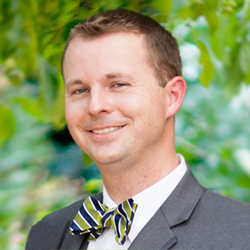"It is a capital mistake to theorize before one has data." - Sherlock Holmes
Though perhaps relatively few use seemingly minute details to solve major crime cases like Sherlock Holmes, data and its analysis enable people to make informed decisions in any field today—and education is no different. Nobody knows this better than Chris Broughton, who has spent the bulk of his professional life using data to find key intervention opportunities that change the trajectory of students' lives. Chris, currently the Executive Director at Bottom Line in Chicago, graduated from the 11th cohort of ACE Teaching Fellows and taught middle school in Oklahoma City. He has learned through years of data-work that it is truly not the numbers that matter, but the people behind those numbers.

As an Economics major at Notre Dame, Chris had studied financial data and models extensively, but his experience with educational data began in his own classroom during the Teaching Fellows program. It is there where he encountered the myriad of ways in which he could use data to create targeted, individualized instruction.
While many think of the classic green Ward gradebook when visualizing the ways teachers took grades in elementary school, the teaching profession Chris encountered in Teaching Fellows had evolved to become much more sophisticated. Gradebooks were starting to go online and came equipped with tools to find means, medians, standard deviations, and top and bottom quartiles without having to touch a calculator. Through the guidance of the Teaching Fellows curriculum, Chris saw how he might use these tools practically to guide his instruction, not simply report the numbers.
After his two years in Teaching Fellows, Chris was interested in working in education outside the classroom and so pursued an opportunity with the ACE team. While with ACE, he worked with the ACE Fellowship, now ACE Advocates, which represented a renewed attempt by ACE to serve graduates by gathering information on what graduates did after they left their formation programs. This allowed him yet another opportunity to think of what data to collect, the systems behind this data collection, and how to collect this data efficiently and effectively.
"He has learned through years of working with data that it is truly not the numbers that matter, but the people behind those numbers."
After two years, Chris decided to join the Cristo Rey network as the Senior Director of College Initiatives in Chicago. He now became responsible for maximizing the number of high school seniors to enter college from the Cristo Rey network. To accomplish this, Chris educated himself on which data would be most useful in his work and how best to acquire it. In his early days at Cristo Rey, Chris and his team noticed a discrepancy in the number of high school students that received acceptance letters to college and the number that actually arrived on campus in the fall to take courses. This attrition became called the "Summer Melt" and turned out to be a growing national problem.
Chris, therefore, dove deeper into the data and sought to find the core reasons behind this gap. Through his work, Cristo Rey devised plans to build up support systems, such as the College Completion Program, that were statistically proven to be most effective. They formalized partnerships with higher education institutions, agreeing to analyze what the schools were doing to recruit, retain, and then graduate students from their networks. They went beyond the data by conducting 1-on-1 phone calls with students to paint a qualitative picture of the students' stories. They listened first, then acted.
The plan Chris and his colleagues created focused on opening the channels of communication with students early so they could foresee potential problems in college enrollment. They built more intelligent files on each student so they could best meet his/her needs, be that financial, familial, or otherwise. In short, they let the data tell them where and how each student needed them to help. Their results allowed them to secure grants from The Michael & Susan Dell Foundation and The Bill and Melinda Gates Foundation to push the needle towards more students actually enrolling in colleges.
Chris maintains he never fell in love with the actual crunching of numbers or the simple use of data systems. Though he still works closely with data analysis at Bottom Line to continue to improve enrollment numbers in colleges, Chris believes that it is the pursuit of asking new and more informed questions of the data that keeps him interested. He knows that being an effective "data-person" is so much more than utilizing complex functions into an Excel document. Sound analysis requires one to see not only what is there, but also to see the gaps that exist and how the data might help address those gaps. More than this, Chris understands that working in a field like education is a unique blessing because those data points on his screen represent something much more than just GDP or quarterly growth—they represent real children just like those he taught in Oklahoma City. It is Chris' numbers-driven analysis that allows him to create real-world solutions that empower Catholic schoolchildren to persist and find success in higher education.
 Chris Broughton served as an AmeriCorps member at Cristo Rey in Oklahoma City, Oklahoma.
Chris Broughton served as an AmeriCorps member at Cristo Rey in Oklahoma City, Oklahoma.
 Alliance for Catholic Education
Alliance for Catholic Education
